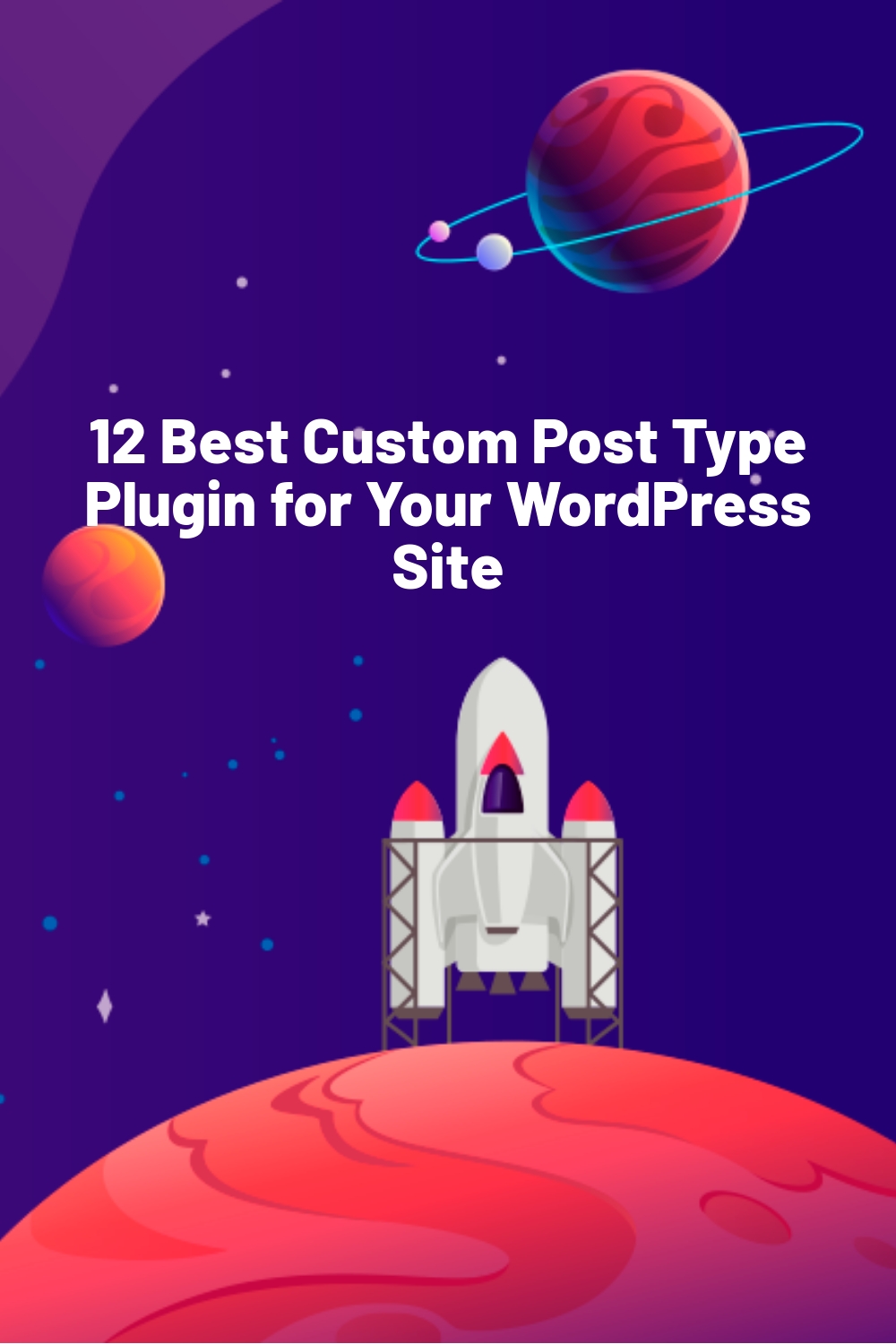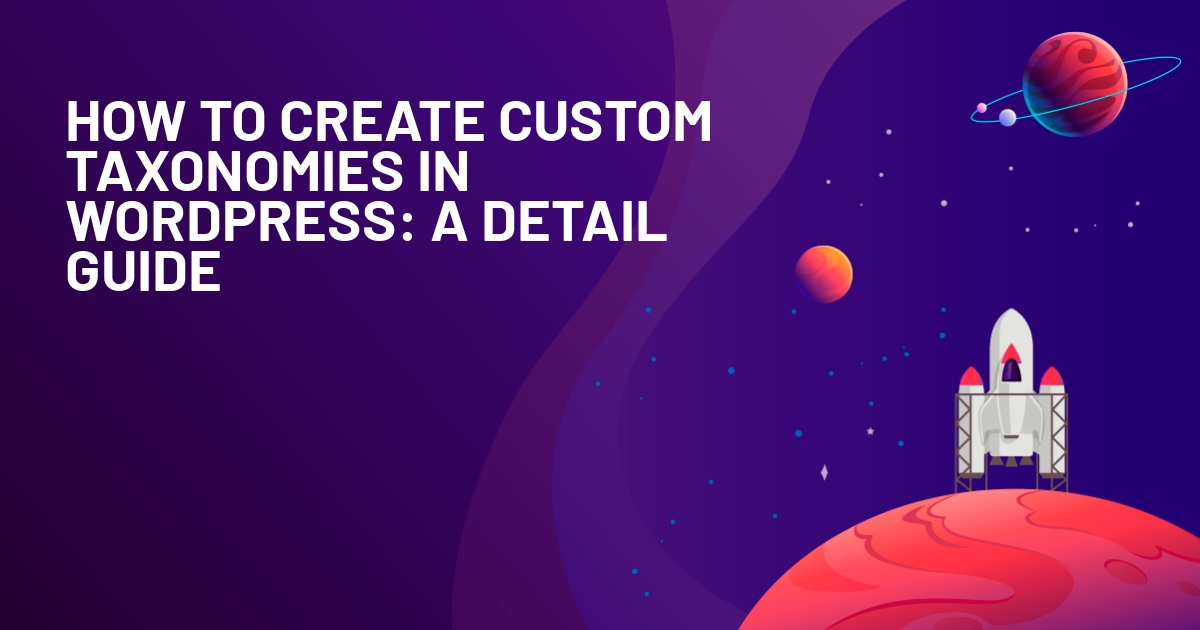WPLift is supported by its audience. When you purchase through links on our site, we may earn an affiliate commission.
12 Best Custom Post Type Plugin for Your WordPress Site
Looking for the best WordPress custom post type plugins in the market? This post is right up your alley.
Your website’s content is a critical component in making your services as clear and understandable as possible. WordPress comes with a variety of built-in content kinds that are best suited for simple blog websites.
You can’t meet your company’s needs in this competitive digital environment until you provide your business website a personalized design using custom post types WordPress. Different content categories may be used to make appealing and eye-catching websites.
In this article, you’ll discover what is a custom post type in WordPress and its purpose, as well as the top 12 custom post type plugins available. We’ll also go through the features of each plugin and show you its pros and cons so you can pick the best custom post-type plugin for your needs.
What Is a Custom Post Type?
It is a unique piece of material that you produce after logging into your WordPress website’s dashboard. You’ll notice a specific interface for your blog posts when you go to Posts and click on Add New Post. To publish your article, you have a variety of choices for adding paragraphs, photographs, lists, audio, and more.
The custom post type, also known as the custom content type, is not included in WordPress by default and is used for more than just blog articles. Using the same editor, you may generate more particular sorts of content and make your website easier to maintain.
If you wish to add a custom post type for items, go to the Products menu and click Add New (if it isn’t available, you’ll need to install the woocommerce plugin offered by WordPress to utilize the eCommerce store’s capabilities). It will also assist you in displaying testimonials, a product gallery, and other features in order to improve your conversion rate.
What Is the Purpose of the Custom Post WordPress Plugin?
WordPress is a content management system (CMS) that organizes and displays posts by post type. The post type “page” applies to the website’s page, whereas “post” applies to blog posts/articles. WordPress has a number of predefined post kinds, including:
- Post
- Page
- Attachment
- Revision
- Navigation Menu
With the aid of the custom post type WordPress plugin, you can also delete the built-in functionality and replace it with your own custom functionality. The custom post is similar to a standard post, but its post type value is different. The following are some custom post type examples:
- Testimonials
- Products
- Places
- Media
- People
- Online Store
Why Do We Need Plugins for WordPress Custom Post Types?
You are not limited to using only the WordPress built-in post kinds to display your material in a certain way. When is it necessary to create custom post types? When your content can’t be displayed in a post or a page, but you still want to show titles, email addresses, phone numbers, photographs, and other information. Furthermore, you may set the post layout on each page of your website as you choose.
Consider the following blog and portfolio examples for a better understanding. You’ll want to set them apart by displaying and structuring them with distinct sorts of information.
Expert developers can construct their own post types, but if you’re a newbie, the plugin options are the best way to get the functionality you need. There are several free WordPress plugins accessible, however, if you are unable to complete a task, any commercial plugin can be used.
Making Your Own Post Types
Plugins and scripting are the two basic methods for generating new post types. Plugins are for those who aren’t tech-savvy and wish to personalize their post kinds. Developers who grasp the fundamentals of developing bespoke posts from scratch, on the other hand, employ codes.
There are several plugins available that help non-tech designers personalize their blogs. Here in this article, We will introduce to you the ten most often used custom post types.
1. Toolset Types

Toolset allows you to create custom post kinds, custom fields, and custom taxonomies without using any PHP code, making it a perfect alternative for both novice and experienced developers looking to save time while developing websites.
Toolset allows you to construct post connections, which makes it easier for you to manage your website by connecting related content. You may also create reusable field groups in your custom fields so that you can quickly repeat a collection of fields.
ToolsToolsetet just announced Toolset Blocks, which allows you to use the Gutenberg editor to build blocks with dynamic content. Toolset Blocks may also be used to create custom post-type templates, archives, and searches. Toolset is fully compatible with a number of popular plugins and themes, including WooCommerce, WPML, and Elementor, as well as significant themes like OceanWP and Astra.
Pros
- Furthermore, Toolset allows you to construct more advanced features such as a custom search, front-end forms, sliders, and maps.
- It is a wonderful option if you’re searching for a plugin that supports custom post types and allows you to add crucial functionality that every unique website needs.
Cons
- Its documentation is not well-written
Price
- 1 Site – $69 – contains all components and is limited to a single site
- 3 Sites – $149 – contains all components and allows you the creation of three websites.
- $299 for infinite sites – comprises all components and supports an infinite number of websites.
- After the first year, all plans receive a 25% renewal discount.
2. PODS

Even with high complexity, the Pods plugin allows the user to handle all of their unique content needs in one place. This plugin allows you to build custom post types, taxonomies, and fields. Shortcodes and widgets make it simple to show custom content.
With the relationship fields, connections may be made between the material to help arrange it in a logical and usable manner. Beyond regular WordPress posts and pages, skills may be developed and content maintained.
For media uploads, fields may be defined and maintained. It’s also simple to add more context and upload to it. Builder can also be utilized in designs with tightly interconnected parts.
Pros
- The user interface is straightforward and easy to use.
- Custom taxonomies can also have custom fields.
- Advanced Content Types with their own database tables can be created.
- Extending current content types like Post Types, Taxonomies, Media, Users, and Comments is also possible with the WordPress plugin.
Cons
- It’s not for novices; you’ll need some basic expertise to figure out how to achieve the essential features by reading the excellent documentation.
Price
- 100% free
3. Custom Post Types Maker

Custom Post Type Maker is a simple WordPress plugin that does its job. Despite the fact that this plugin does not have as many settings as the others on our list, it still performs an excellent job. You may rely on this one if you’re seeking a no-nonsense solution for developing custom post kinds.
When you install and activate the plugin, it will add a new menu item called ‘Post Types’ to your WordPress menu. Go to Post Types > Post Types and click the ‘Add New’ option to create a new post type. You’ll find all of the choices for your custom post type on the next page.
Aside from the standard choices, this plugin offers a number of additional features, such as hiding the post type from the menu as well as the search results. You can also customize the post type’s editing options and build custom taxonomies with this plugin. It includes extensive documentation that may be difficult to understand for newcomers.
By heading to Post Types > Taxonomies and pressing the ‘Add New’ button, you may build custom taxonomies.
Pros
- In the user interface, there are separate sections for “Post Types” and “Taxonomies.”
- It gives you the ability to handle custom post kinds such as ordinary posts and pages through an interface.
- The majority of a WordPress custom post type plugin’s features are available.
- Allows you to set practically all of the CPT API’s parameters.
Cons
- Custom post types and taxonomies are not displayed.
- It is not frequently updated, hence it is not commonly used.
Price
- This plugin is available for free
4. WCK Custom Post Types and Custom Fields

Users may easily develop and manage custom taxonomies, custom post types, custom fields, and meta boxes for pages, articles, and custom post types using the WordPress Creation Kit.
It uses three methods to do this. WCK Custom Fields Creator is the first, and it provides a user interface for creating custom meta boxes for posts, pages, and custom post types with custom fields. WCK Custom Post Type Creator and WCK Custom Taxonomies Creator assist them in developing and changing custom post types and taxonomies, respectively.
Pros
- This is possibly the simplest WordPress custom post type plugin, with a simple interface.
- Custom post types, custom taxonomies, custom fields, and Meta boxes for posts, pages, and custom post types may all be created and maintained using the WordPress custom post type plugin.
- On the “General Settings” page, there is a Quick Startup Guide.
- Different post kinds and display themes may be used to arrange the admin.
Cons
- The free version has limited functionality.
- It is not often updated.
Price
- The Premium version starts at $49
Get WCK Custom Post Types and Custom Fields
5. Custom Post Types UI

Custom Post Type UI is a user-friendly interface for managing and registering custom post types and taxonomies for the website. This plugin’s expanded version has a sophisticated user interface for displaying data from custom post types. This plugin was created with the help of GitHub. It has a lot of post kinds and is a very easy-to-use yet powerful plugin.
Custom Post Type UI also supports several post-editing features.
Pros
- A user interface that is both effective and thorough, as well as simple to use.
- Custom post types may be added to either built-in or custom taxonomies.
- Support for a variety of post editor options.
- The plugin has registered custom post types and taxonomies, which are listed individually.
Cons
- It merely creates the types; you must manually add them.
- Adding custom fields is not a built-in functionality.
Price
- The plugin is available in both free and paid editions.
- The extended version costs $29 for a single site
- $49.00 for two to five sites
- $84.00 for unlimited sites
6. Metabox

Meta Box is a custom fields plugin and framework that allows users to modify their websites. There are approximately 500.000 active installs of the plugin, with over 100 five-star ratings. It is one of the greatest WordPress Custom Post Types Plugins. It is a professional toolkit for WordPress developers that allows them to design and manage custom fields and custom meta boxes. There are several field kinds to choose from, as well as several possibilities for each. Check out our Meta Box review.
Pros
- The user interface is simple and intuitive, featuring drag-and-drop features.
- Meta boxes may be created for the user meta, term meta, and settings page, and presented using groups, columns, and tabs.
- It also works with the multilingual WPML plugin.
- Meta Box is compatible with a wide range of themes and plugins.
Cons
- Forms (submit posts and establish user profiles on the front end) and relationships have yet to be included in the Meta Box custom fields plugin.
Price
- $699 Lifetime Bundle
- $229 Ultimate Bundle
- $149 Basic Bundle
7. ACPT Lite

Advanced Custom Post Type or ACPT is an intuitive and flexible framework built with scalability in mind. The plugin’s Lite version is best suited for new websites managed by users that don’t have coding experience.
Its full version enables digital agencies and developers to have more freedom when creating custom posts. The free edition of this plugin includes an Elementor widget and Gutenberg shortcode generator.
You’ll have to upgrade to one of the ACPT’s plans if you want to create up to 28 meta boxes, gain access to the Divi module, or control post type relationships.
Pros
- Users can create taxonomies
- The plugin is compatible with the default WordPress block editor
- ACPT Lite supports WooCommerce integration
- The plugin is updated regularly
Cons
- A low number of active installations
- Visual builder is only available on the paid version of the plugin
Price
- Basic Plan – $29 per year
- Personal Plan – $49 per year
- Agency Plan – $99 per year
8. MB Custom Post Type

The “MB Custom Post Type” plugin provides an easy-to-use interface for creating and managing custom post kinds and taxonomies.
Pros
- The whole set of options for creating custom post types and taxonomies is available.
- Supports live editing mode, which automatically fills up all required labels!
- Export to PHP code, which you can then copy and paste into your themes and plugins.
- Custom post types may be exported/imported using standard WordPress capabilities (no plugins required!).
Cons
- The MetaBox plugin had to be installed
Price
- FREE
9. Post Type Builder

This plugin is ideal for novice website designers because it lets them build custom posts without writing a single line of code. Post Type Builder offers an abundance of post type options including the Featured Image, Tags, or Title.
It also features a broad spectrum of taxonomies allowing you to group your content based on the number of rooms or property type.
The plugin comes with Map view, Submissions, Extra Field, and other add-ons. It’s compatible with the WPML plugin and it enables users to create custom post types in different languages. But these plugins are sold separately.
Pros
- Users can import or export custom post templates
- The plugin has a powerful Meta Box Builder
- Creating a custom post type template is easy
- The developer offers an impressive demo collection
Cons
- Creating multilingual custom pages costs extra
- Testing the plugin for free isn’t possible
Price
- PTB Bundle – $49 one-time payment
10. Custom Post Types Unlimited

The Custom Post Kinds Unlimited plugin allows you to use the WordPress admin to create your own custom post types and taxonomies for your website. When adding or updating items, all post type and taxonomy parameters (label, custom menu name, icon, slug, and so on) are available.
Pros
- Getting started is simple.
- You can create an endless number of post kinds and taxonomies.
- The WordPress interface is used.
- There are no adverts or upsells for the “pro” version – the plugin is absolutely free.
- Developers will appreciate it (hooks available to add your own settings to admin).
Cons
- There are no choices for custom fields to be added to your post types
Price
- Free
Get Custom Post Types Unlimited
11. Custom Post Type Widgets

Despite having over 20,000 active installations, the Custom Post Types Widgets plugin isn’t among the most popular options for WordPress users who want to create custom posts on their sites.
Custom Post Type Widgets has only twelve reviews in the WordPress plugin repository which makes assessing its capabilities difficult. Consequently, the best way to determine if this plugin is the right solution for you is to install it and test its features.
You’ll have access to 45 tags and you’ll be able to see how many tags each custom post or taxonomy contains.
Pros
- The plugin has dozens of unique hooks
- It simplifies filtering custom posts based on their title, type, or class name
- Users can create search forms
- Its interface is intuitive
Cons
- The Custom Post Types Widgets plugin isn’t compatible with other WordPress Custom Post Type plugins
- Users cannot use the plugin to create custom posts
Price
- Free
12. Post Type Switcher

The Post Type Switcher plugin lets you change a post’s type, so you can easily convert a regular post to a custom one. It also lets you turn a page to a post and vice versa.
Its bulk editing function can be useful if you’re planning on turning a vast number of pages or posts into custom posts, but this is where the plugin’s functionalities end. Hence, you cannot use it to create a custom post type from scratch.
Pros
- The plugin adds a drop-down menu to Gutenberg
- It makes changing a post type easy
- Post Type Switcher is lightweight
Cons
- It doesn’t work with all WordPress themes
Price
- Free
Frequently Asked Questions about WordPress Custom Post Type Plugins
Which Plugin Creates Custom Post Types?
You’ll have a wide range of options at your disposal when choosing a custom post plugin. PODS, Toolset Types, and Meta Box are some of the most powerful plugins you can use to create custom posts, custom taxonomies or establish relationships between two or more posts.
You don’t need coding experience to use most custom post type plugins, but you must check if they’re compatible with your website’s theme. Some plugins also allow their users to create and save custom post templates.
How Do I Use a Custom Post Type Plugin?
The steps you must take to create a custom post type will depend on the plugin you choose.
Some plugins add this functionality to Gutenberg or a page builder like Elementor Pro, while others have their own tabs on the admin panel.
In most cases, you’ll have to navigate the plugin’s tab on your site’s dashboard and click the Add New Post Type button. You can then create a post type slug, write the post type’s description and adjust other settings.
Click the Add Post Type button when ready and open the Appearance menu. Find the Menus tab and proceed to add the custom post type you created to your site’s frontend.
How Do I Create a Post Type in the WordPress Plugin?
Creating a new post type is simple. You just have to select the post type you want to make and adjust the settings.
Most plugins allow their users to create products, testimonials, media, and countless other types of posts.
Once you choose the post type you must create a slug and specify singular and plural versions of its label. Afterward, you should configure other settings before making the custom post visible on the site frontend.
Some plugins allow users to create their custom post types, but this isn’t a standard feature in all custom post type plugins.
What Are Post Types in WordPress?
WordPress will contain seven post types unless you install a plugin that will extend the number of post types you can use.
You’ll have access to the following post types after you install WordPress:
- Posts
- Pages
- Attachments
- Navigation Menus
- Changesets
- Revisions
- Custom CSS
WordPress uses these post types for different types of content. So, the Custom CSS post type will be used when a user adds custom code to WordPress, while the Posts content type is assigned to regular blog posts.
Each post type has unique characteristics, so you can assign a tag to a Post, but you can perform the same action when creating a Page post type.
What’s your favorite WordPress Custom Post Type Plugin?
Among the plugins listed, our most favorite plugin is the toolset type. Without having to write any code, the Toolset Kinds plugin makes it simple to create new post types and custom fields. It also lets you examine all of your custom post types and custom fields in a list format. It’s a lot easier to keep track of things this way.
Wrapping Up!
The feature that transforms WordPress from a simple blogging platform to a full content management system is custom post types. They let you build complicated, custom websites that may serve as storefronts, reference centers, media sites, or whatever else you require.
It’s simple to make your website stand out from the crowd with these custom post-type plugins. This is significant since a distinctive website that is also SEO friendly may attract a large number of visitors, which is what every website owner wants.
To summarize, we have provided you with a list of the most useful WordPress custom post-type plugins. I hope this post was helpful in your search for the best WordPress Custom Post Type Plugin!








